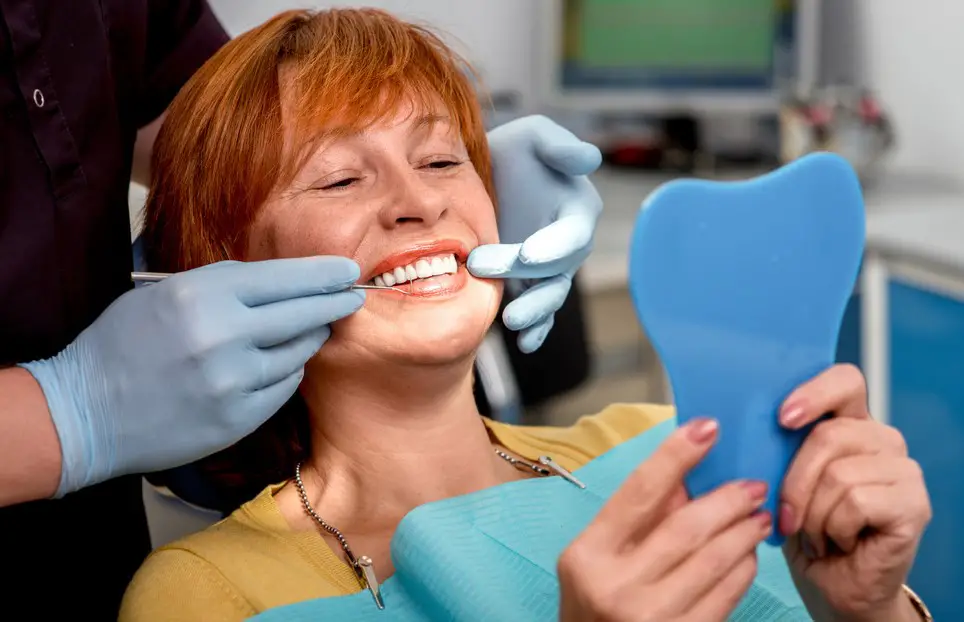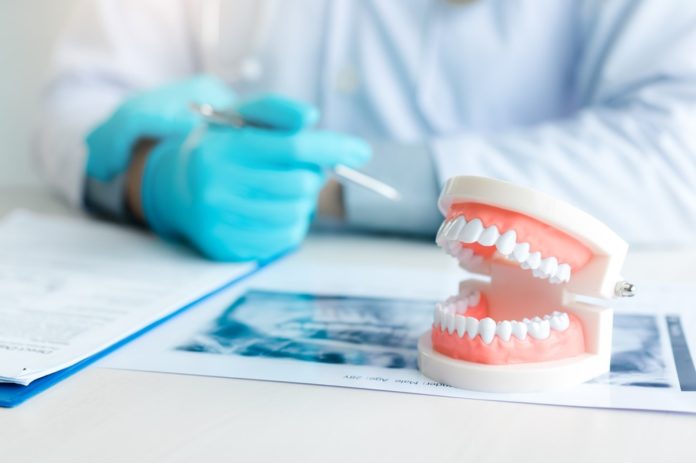Missing teeth can cause discomfort, inconvenience, and oral health issues for those afflicted. It poses challenges when eating or speaking since the bare gums will be exposed to pressure and impact without teeth. Mouth movements may become painful and uncomfortable, and some may even have speech impediments because of missing teeth.
Aside from these, having visible gaps between teeth can cause embarrassment due to the unnatural appearance it creates. It can also alter one’s face and lip shape, sometimes making the person look older than their actual age.
Because of the detrimental effects of tooth loss on a person’s appearance, some may be forced to minimize or avoid interactions altogether. For these reasons, many opt for dentures to fill in the gaps and restore their mouth’s appearance and natural functions.
While dentures have been proven effective as teeth replacement, some patients feel intimidated or worried about getting them, especially if they’re unaware of what to expect when using these prosthetic devices. Hence, it’s best to learn more about dentures before acquiring and using an actual product to address your dental needs.
If you’re considering getting dentures for the first time and want to know more about them, continue reading this article.
The Benefits Of Dentures
Dental health experts such as Grove City Dental offer dentures as the ideal solution for those who want to fill gaps in their mouths and restore their smiles. Here are some of the benefits of having dentures:
- Improves Oral Health
Dentures can help you avoid various oral health issues and gum diseases, as they can protect you from pressure, impact, and bacterial buildup. Because of the benefits they offer to patients with missing teeth, dentists often recommend permanent dentures to their patients.
- Restores Youthful Appearance
The teeth support the muscles around the mouth, which may start to sag or sink in their absence. When this happens, the facial shape may alter, and the lack of definition may create an aged appearance. As a remedy, dentures can lift and stretch facial muscles, giving the face a fuller and more youthful look.
- Helps With Normal Mouth Functions
Tooth loss can cause discomfort, especially when talking and eating. To restore the ability to chew and speak easily, you can consider getting dentures to fill in gaps left by missing teeth.
- Boosts Self-Confidence
Having missing teeth, especially in visible parts of the mouth, can make a person feel self-conscious and shy to interact or talk to others. This situation can significantly diminish a person’s confidence, which is why getting quality dentures will be helpful.
- Allows Easy Cleaning And Maintenance
Aside from their purposefulness, dentures are also generally easy to clean and maintain. You can wash them as you brush your teeth twice daily and soak them overnight in water or a denture-cleaning solution to retain their form and quality.
Types Of Dentures
There are several types of dentures you can choose from depending on the condition of your mouth and gums, the size of the gap to be filled, the availability of products, your budget, and personal preferences. Here are some examples of types of dentures:
- Full Dentures
Full dentures, also called traditional or complete dentures, serve as replacements for the upper or lower parts of the teeth. Some are also able to cover both parts depending on the requirement. They’re designed to be placed on top of the gums, making them easy to wear and remove.
- Partial Dentures
Partial dentures cover specific portions of the mouth where missing teeth leave gaps. The base commonly secures them snapped on the roof of the mouth and the metal pieces that hold the faux teeth together. Similar to complete dentures, partial dentures are also made to be easily removable to allow thorough cleaning and should be soaked in water to retain moisture.
- Instant Dentures
Some dentists recommend instant dentures to their patients immediately after extraction to allow them to retain their mouth’s normal appearance while waiting for permanent dentures. These dentures also protect the gap left on the gums when teeth are removed.
Instant dentures are only made as a temporary solution and are expected to last up to three months before a permanent replacement is needed.
- Snap-In dentures
Patients who have enough bone and gum strength and structure have an option to use snap-in dentures, which offer the best stability among other denture options. Unlike traditional designs, snap-ins are secured by connecting to the dental implants surgically embedded on specific jaw points. The dentures are then snapped to attach to the implants or locators, making them easily removable for cleaning.
Apart from these examples, you can also find economy dentures or those that can instantly be used. Named after their cost-effectiveness, economy dentures are more artificial-looking than their pricier counterparts.
How Dentures Are Installed

To get custom dentures, you’ll have to consult with your dentist so that the design will suit your dental requirements. For instance, you may need a complete denture to fill in a significant gap or if you’re looking for a replacement for your old dentures.
Your dentist will start by taking measurements and impressions, which may be done sooner or later after damaged teeth are removed. In some cases, the dentures are fitted to protect the healing gums after extraction. However, your dentist may also recommend you wait until your gums are fully recovered before putting your denture in place.
Here are other steps you can expect during the denture fitting, designing, and installation process:
- Taking mouth impressions for the custom dentures
- Bite casting using wax blocks
- Creation of wax models which will serve as your visual guide to give you an idea of how your dentures will look like
- Fitting of finished dentures
Depending on the work required, it can take up to four or five dental appointments before you can have the perfect-fitting dentures. Your dentist can also assist you as you put them on for the first time, ensuring they’re adequately secured and handled with care.
Maintaining Your Dentures
It may take a while for a person to get used to wearing their new dentures, with some having to wear them until bedtime to help with the adjustment. You can do the same with the advice of your dentist, though wearing dentures while sleeping may not be advisable for everyone, especially for those with gum sensitivities.
Apart from these, here are other steps you can take to maintain your dentures:
- Observe Proper Dental Hygiene
As you wear dentures, you’ll need to ensure they remain clean and free of food debris. Doing so will help you prevent foul breath, bacteria buildup, plaque, and tooth decay. You’ll also avoid gum diseases and other oral health issues by brushing your teeth and dentures twice daily with fluoride toothpaste.
When cleaning your dentures, handling them with care and avoiding scrubbing too hard to prevent damage is essential.
After cleaning, dentures should be submerged in water to retain moisture and prevent stains. You can also use a denture-cleaning solution to prevent them from drying out and being deformed.
- Use Dentures With Care
Dentures are made to withstand pressure and friction from speaking and chewing, though they can be prone to damage, especially for new users. Limiting your diet to softer food items is advisable to prevent early breakage until you gradually get used to chewing with your new dentures. You can also cut your food into smaller pieces and chew carefully using both sides of your mouth.
Aside from these, you’ll also need to avoid eating food items that are too sticky, hard, or sharp. Finally, use only dental hygiene products to clean your dentures, such as toothbrushes and floss. Avoid using a toothpick to remove food debris, as it can lead to breakage.
- Secure Your Dentures With Dental Adhesives
Well-fitted dentures should stay in place without the help of adhesives, though users sometimes find the need for this product, especially if the dentures have started to shake, slip, or make clicking sounds. Should you find the need to use adhesives, it’s best to consult with your dentist first so you can get product recommendations and guidance as needed.
Also, you’ll need to clear your mouth and dentures of any adhesive material residue after each use. You can do so by brushing the dentures with toothpaste and water and wiping your teeth, gums, and tongue with damp cotton.
Conclusion
Dentures are expected to last up to 10 years, given proper care and usage. However, human gums and jawbone may change their shapes as a person ages, affecting dentures’ overall feel and fit. Thus, it’s essential to regularly visit the dentist to have them check the dentures’ fit and see if adjustments may be required.
You’ll also need to see your dentist if your dentures start to move or slip when you speak or eat. Also, you must consult your dentist immediately if you feel discomfort or pain while wearing them. Poor-fitting dentures can cause pain and damage to your oral health, so it’s best to seek help from your dentist when they occur.

